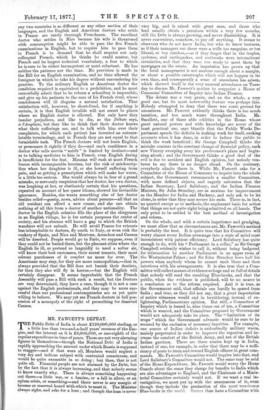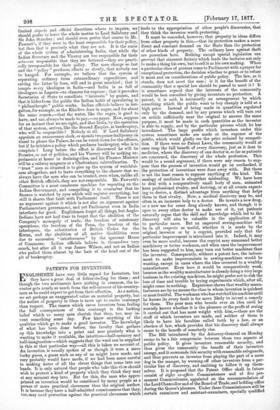MR. FAWCETT'S DEFEAT.
ITIHE Public Debt of India is about £120,000,000 sterling, or JL a little less than two-and-a-half years' revenue of the Em- pire, and the interest on it is £6,000,000, or one-eighth of the regular expenditure in time of peace. Those are not very alarming figures in themselves--though the National Debi:, of India is rapidly approaching the amount under which Russia is supposed to stagger—and if that were all, Members would neglect a very dry and tedious subject with contented consciences, and would be quite excusable in so doing ; but then, that is not quite all. Financial people are not alarmed by the Debt, but by the fact that it is always increasing, and that nobody seems to know exactly why. There is always something happening out there—a little war, or a famine, or a fall in silver, or an opium crisis, or something—and there never _is any margin of income or reserved hoard with-which to meet it. The Minister always sighs, and asks for a loan ; and though ihelnan is never
very big, and is raised with great ease, and those who lend usually obtain a premium within a very few months, still the Debt is always growing, and never diminishing. It is never convenient, somehow, to pay off anything. It seems to observers who do not know India, but who do know business, as if their managers out there were a trifle too sanguine, or too liberal, or too careless,—as if they forgot that in the tropics, cyclones, and earthquakes, and outbreaks were intermittent certainties, and that they were too ready to meet them by mortgages on the estate. An impression has grown up that the local management is not anxious enough about a margin, or about a poossiblecoaotoutsltrophewhicohll
will not in its
own time, and consequently y o sense f uneasiness
arisen, which showed itself in the very unusual attendance on Tues- day to discuss Mr. Fawcett's motion to reappoint a House of Commons' Committee of Inquiry into Indian Finance.
The debate was a very grave, and on the whole, a very good one, but its most noteworthy feature was perhaps this. Nobody attempted to deny that there was some ground for uneasiness. Mr. Fawcett evidently thinks there is too muelt taxation, and too much waste throughout India. Mr.
Smollett, one of those able oddities in the House whose great natural powers and wide knowledge are never of the least practical use, says bluntly that the Public Works De- partment spends the deficits in making work for itself, cooking accounts when it has done, in order to induce the public to think the work beneficial ; Sir George Campbell thinks the mistake consists in the constant change of financial policy, each new Viceroy sweeping away his predecessor's plans and begin- ning afresh ; and the Government thinks a good deal of the evil is due to accident and English opinion, but nobody ven- tures to say there is no danger ahead. On the contrary, everybody admits there is. While Mr. Fawcett asks for a Committee of the House of Commons to inquire into the whole subject, the Government recommends a smaller Committee, with more defined objects, and eagerly reiterates that the Indian Secretary, Lord Salisbury, and the Indian Finance Minister, Sir John Strachey, are as anxious for improvement as the Member for India and Hackney, and only ask to be let
minetahyosc7scurtheehoinspelneasdson. unpleasant basisisfo,rinaofirton, that things are not quite right being admitted on all hands. The nalooncinuel,yai nr r eorderlex o except that st they to
only point to be settled is the best method of investigation and reform.
On the whole, and with a certain impatience and grudging, we must allow that as circumstances are, Mr. Fawcett's method is probably the best. It is quite true that his Committee will worry almost every Indian personage into a state of mind most inconsistent with patient efficiency. Lord Salisbury has quite enough to do, with his "Parliament in a cellar," as Sir George Campbell evidently wishes to call it, without being badgered for information by another Parliament in an upper room of the Westminster Palace ; and Sir John Strachey loses half his powers when anybody whom he cannot snub there and then interferes with his arrangements. It is also true that a Com- mittee will collect masses of evidence so huge and so full of details that nobody will read the resulting Blue-books, and that the public, when the evidence is published, will be no nearer to a conclusion as to the reform required. And it is true, as the Government said, that officials can hardly be spared from India ; and true, as they did not say, that a great importation of native witnesses would end in bewildering, instead of en- lightening, Parliamentary opinion. But still, a Committee of Inquiry which is feared is, nine times out of ten, a Committee which is wanted, and the Committee proposed by Government would not adequately take its place. The "limitation of its scope" which the Government advocate would be sure to be secured by the exclusion of necessary inquiries. For example, one source of Indian deficits is undoubtedly military waste, perpetrated in order to improve the organism and in- crease the comfort of the British Army, and not of the Pritish Indian garrison. There are three armies kept up in India, instead of one, for example, in order that there may be a suffi/- ciency of posts to train and reward English officers in great corn, mends. Mr. Fawcett's Committee would inquire into that, and Lord Salisbury's Committee would not. The same may be NW of the Home Expenditure. Mr. Fawcett would worry the Hors. 0 Guards about the sums they charge for benefits to India wluch are also advantages to England, and the Chairman of a litiuie- terial Committee certainly would not. If we want a real in. vestigation, we must put up with the annoya.ncea 9f it, even though they include the production of the most wearisome Blue-books in the world. Soener than have a Committee wiAll limited objects and official directions where to inquire, we should prefer to leave the whole matter to Lord Salisbury and Sir John Strachey; and should even prefer that course to Mr. Fawcett's, if they were in the least responsible for their policy, but then that is precisely what they are not. It is the curse of the whole system of administering India, that while the Indian Secretary and the Viceroy are too responsible for their acts—so responsible that they are fettered—they are practi- cally irresponsible for their policy. The men change so fast and the " policy " produces effects so slowly, that nobody can be hanged. For example, we believe that the system of separating ordinary from extraordinary expenditure, and raising the latter by loan, will end in great mischief ; that it tempts every ideologue in India—and India is as full of ideologues as Laputa—to clamour for expense ; that it provokes Secretaries of State to conciliate " interests " by grants, and that it hides from the public the Indian habit of speculating in "philanthropic" public works. Indian officials believe in irri- gation, for example, as the Khedive does in sugar, and for about the same reason,—that the water, like the sugar, is good to have, and can always be made to pay,—on paper. Now, suppose for an instant that we are right, and that India, by the operation of that system, arrives, like the Second Empire, at bankruptcy, who will be responsible ? Nobody at all. If Lord Salisbury appoints an unnecessary clerk, or spends twopence-halfpenny on tinsel to please the Palace, he can be voted down for the offence, but if he initiates a policy which produces bankruptcy, who is to complain ? Long before the effect is discovered he will be Premier, or out of politics, and his Viceroy will be making ex- periments at home in draining-tiles, and his Finance Minister will be a railway magnate or a Cheltenham valetudinarian. To "trust" men so situated is to give up the system of watchful- ness altogether, and to leave everything to the chance that we always have the men who can be trusted, even when, unlike all other British officials, they are not responsible. Mr. Fawcett's Committee is a most cumbrous machine for reporting on the Indian Government, and compelling it to remember that its finance is watched by eyes which will register everything, but still it shares that fault with Parliament itself. There is not an argument against it which is not also an argument against Parliamentary government, and yet Parliament even in India interferes for good. Englishmen forget all things, but Anglo- Indians have not had time to forget that the abolition of the Company's monopoly of trade, the freedom of missionary operations, the freedom of the Press, the freedom of the interlopers, the substitution of British Codes for the Koran, and the abolition of all native disabilities were due to successive " interferences " by the ignorant House of Commons. Indian officials believe in themselves very much, but after all it was James Wilson, and not an Indian who pulled them almost by the hair of the head out of the -pit of bankruptcy.



































 Previous page
Previous page